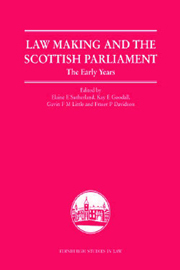Book contents
- Frontmatter
- Contents
- Preface
- List of Contributors
- Table of Cases
- Table of Westminster Statutes
- Table of Scottish Parliament Statutes
- Table of Westminster Statutory Instruments
- Table of Scottish Statutory Instruments
- THE SCOTTISH PARLIAMENT – ITS GENESIS AND OPERATION
- RIGHTS AND SOCIETY
- 3 Human Rights and People and Society
- 4 Child and Family Law: Progress and Pusillanimity
- 5 Culture
- 6 Charity Law: An Issue of Choice
- PUBLIC ADMINISTRATION AND SERVICES
- JUSTICE AND LEGAL SYSTEM
- ECONOMY AND ENVIRONMENT
- Index
6 - Charity Law: An Issue of Choice
from RIGHTS AND SOCIETY
Published online by Cambridge University Press: 05 September 2013
- Frontmatter
- Contents
- Preface
- List of Contributors
- Table of Cases
- Table of Westminster Statutes
- Table of Scottish Parliament Statutes
- Table of Westminster Statutory Instruments
- Table of Scottish Statutory Instruments
- THE SCOTTISH PARLIAMENT – ITS GENESIS AND OPERATION
- RIGHTS AND SOCIETY
- 3 Human Rights and People and Society
- 4 Child and Family Law: Progress and Pusillanimity
- 5 Culture
- 6 Charity Law: An Issue of Choice
- PUBLIC ADMINISTRATION AND SERVICES
- JUSTICE AND LEGAL SYSTEM
- ECONOMY AND ENVIRONMENT
- Index
Summary
INTRODUCTION
The passing of the charities and trustee Investment (Scotland) Act 2005 was a landmark occurrence in the development of charity law in Scotland. It introduced a dedicated charities regulator, created a new definition of “charity” for Scottish charities and introduced a new regulatory regime to allow for the effective monitoring of and potential intervention in the affairs of Scottish charities, built on the information contained in the new Scottish register of charities. Although the public perception may have been that these changes to the landscape of charity law in Scotland only took place as a result of the need to develop a regime which could cope with issues such as those which had arisen from a number of high-profile scandals involving Scottish charities, that would be to ignore the detailed consideration of the potential shape of charity law and regulation which had been ongoing across the united Kingdom in the fifteen years preceding the 2005 Act. the 2005 Act is a product of the Scottish Parliament and it incorporates a range of provisions and mechanisms which reflect choices made during the passage of the legislation. Some of those choices were overtly political in nature yet result in distinct legal consequences. this chapter considers the fundamental changes to charity law in Scotland that resulted from the passing of the 2005 Act and discusses how particular choices and approaches to the key provisions in the Act have resulted in a legislative outcome which is both distinctively Scottish in approach but pragmatically cognisant of a broader united Kingdom social and legal context.
- Type
- Chapter
- Information
- Law Making and the Scottish ParliamentThe Early Years, pp. 103 - 124Publisher: Edinburgh University PressPrint publication year: 2011



